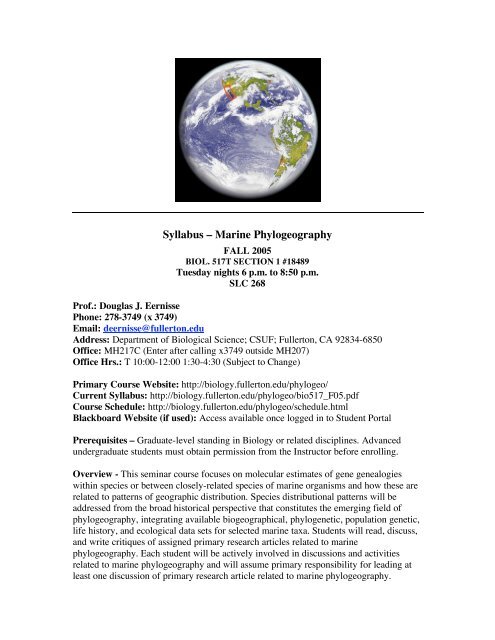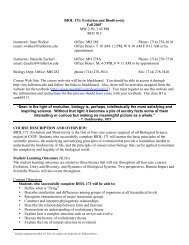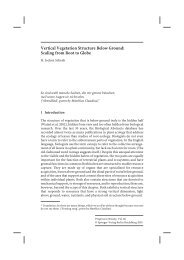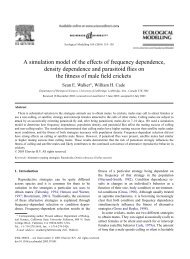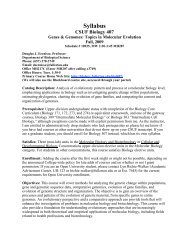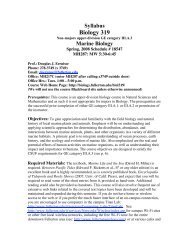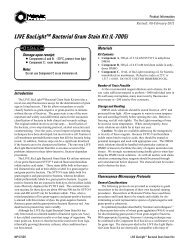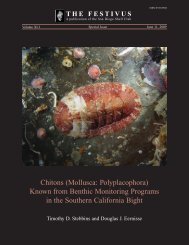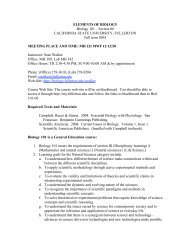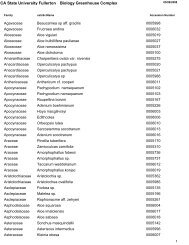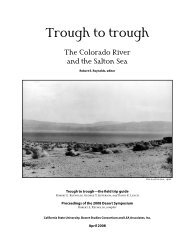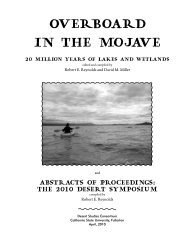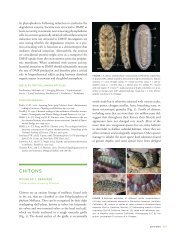Course Syllabus - Biological Science
Course Syllabus - Biological Science
Course Syllabus - Biological Science
You also want an ePaper? Increase the reach of your titles
YUMPU automatically turns print PDFs into web optimized ePapers that Google loves.
<strong>Syllabus</strong> – Marine Phylogeography<br />
FALL 2005<br />
BIOL. 517T SECTION 1 #18489<br />
Tuesday nights 6 p.m. to 8:50 p.m.<br />
SLC 268<br />
Prof.: Douglas J. Eernisse<br />
Phone: 278-3749 (x 3749)<br />
Email: deernisse@fullerton.edu<br />
Address: Department of <strong>Biological</strong> <strong>Science</strong>; CSUF; Fullerton, CA 92834-6850<br />
Office: MH217C (Enter after calling x3749 outside MH207)<br />
Office Hrs.: T 10:00-12:00 1:30-4:30 (Subject to Change)<br />
Primary <strong>Course</strong> Website: http://biology.fullerton.edu/phylogeo/<br />
Current <strong>Syllabus</strong>: http://biology.fullerton.edu/phylogeo/bio517_F05.pdf<br />
<strong>Course</strong> Schedule: http://biology.fullerton.edu/phylogeo/schedule.html<br />
Blackboard Website (if used): Access available once logged in to Student Portal<br />
Prerequisites – Graduate-level standing in Biology or related disciplines. Advanced<br />
undergraduate students must obtain permission from the Instructor before enrolling.<br />
Overview - This seminar course focuses on molecular estimates of gene genealogies<br />
within species or between closely-related species of marine organisms and how these are<br />
related to patterns of geographic distribution. Species distributional patterns will be<br />
addressed from the broad historical perspective that constitutes the emerging field of<br />
phylogeography, integrating available biogeographical, phylogenetic, population genetic,<br />
life history, and ecological data sets for selected marine taxa. Students will read, discuss,<br />
and write critiques of assigned primary research articles related to marine<br />
phylogeography. Each student will be actively involved in discussions and activities<br />
related to marine phylogeography and will assume primary responsibility for leading at<br />
least one discussion of primary research article related to marine phylogeography.
Written assignments will require research of the primary literature and could also involve<br />
reanalysis of related data sets.<br />
<strong>Course</strong> Organization - The course will be organized as follows into four phases:<br />
1. Introduction to the physical and biological features of marine ecosystems relevant to<br />
the principles of phylogeographic analysis (Led by instructor, weeks 1-4)<br />
2. Investigation of particular research articles from the primary literature related to Baja<br />
phylogeography (Led by enrolled students, weeks 5-13)<br />
3. Student presentations (15-20 minutes each) of final projects, emphasizing the<br />
phylogeography of a particular taxon of marine organisms and based on original<br />
reanalysis of one or more selected primary research articles.<br />
Approximately the first four sessions will be devoted to an overview of basic concepts in<br />
marine phylogeography, with some emphasis on the West Coast of North America,<br />
including aspects related to local southern California marine habitats. Specific readings<br />
will be assigned for these introductory sessions, and these will be distributed as<br />
photocopies the week before they will be covered if not posted in pdf format to the<br />
“<strong>Course</strong> Documents” section of the <strong>Course</strong> website.<br />
Weekly Written Synopses – Starting with week 2 and ending with week 13, you will be<br />
expected to read the weekly assigned article(s) and write a synopsis and discussion of the<br />
main points, to be turned in at the start of the class when the article(s) will be discussed.<br />
The format you choose in your write-up is up to you. The score you receive for each<br />
synopsis write-up will be based on the following rubric (20 points possible):<br />
1) Do you provide an accurate overview of the main points from the assigned reading,<br />
including discussion of alternative hypotheses that are addressed, the source of new<br />
data analyzed, results obtained, and discussion of their implications? Do you<br />
appropriately cite the article? Do you provide a concise and original synopsis of the<br />
important conclusions avoiding merely quoting long portions of the assigned reading?<br />
(8 points)<br />
2) Do you build on the previous readings and seminar discussions, for example, do you<br />
address questions raised in either the assigned reading or in seminar discussion? Does<br />
the research article(s) help in comparing or contrasting terrestrial and marine patterns,<br />
or the patterns observed by different taxa within one of these categories? (3 points)<br />
3) Do you offer a critical analysis of the significance of this article relative to previous<br />
studies, for example, those cited by the author(s)? Are previous interpretations of<br />
phylogeographic pattern further supported or contradicted? If contradicted, are the<br />
new hypotheses or evidence compelling in providing a more general explanation for<br />
the pattern or does it more likely apply only to the specific case investigated? Do you<br />
appropriately use citations for ideas that come from other people? Do you summarize<br />
the important conclusions of previous articles in your own words rather than quoting?<br />
(3 points)<br />
2
4) Do you present your own ideas or questions and allow them to be considered in light<br />
of the current evidence, and do you consider alternative ideas? Do you recognize<br />
naïve ideas and relinquish or refine them after considering evidence? (3 points)<br />
5) Is your writing clear and free of mechanical errors (complete sentences, well<br />
organized, grammatically correct, legible, and free of spelling errors)? (3 points)<br />
Note: Papers will not be accepted after the start of class (6:00 p.m.) without a legitimate<br />
medical excuse. The reason for this policy is to ensure that you will come to the<br />
scheduled course meeting time ready to discuss the assigned reading. Papers must be<br />
hard-copy, not electronic via email.<br />
Student-led Discussions - Starting with the sixth week, the weekly discussions will be<br />
led by one or two enrolled students. If you choose to share your leadership role with<br />
another student then you will each be expected to lead a second week, preferably each<br />
with different partner for the second session. A carefully selected list of articles from the<br />
primary literature involving important aspects of marine phylogeography will be made<br />
available on-line as announced in class on the first class meeting. When available, there<br />
will be links to a PDF version of the article, which you can read on-line or print out on<br />
your own printer. The weekly presentations will either be organized around a particular<br />
topic related to marine phylogeography or around a specific paper. Each student will be<br />
expected to choose a featured paper with or without a more general topic. While emailing<br />
your choice(s) to Prof. Eernisse at deernisse@fullerton.edu might help reserve a topic<br />
you wish to present, the exact details of scheduling will be up to Prof. Eernisse and<br />
further announcements will be made by the third week on the selection procedure.<br />
Generally, students will only be expected to read a single featured full-length paper each<br />
week. However, each presenter will be expected to research multiple related articles in<br />
addition to the one featured. One week before a presentation, the scheduled presenter(s)<br />
will be expected to distribute a “study outline” for the upcoming presentation to the rest<br />
of the class. These outlines should be designed to help students with their conceptual<br />
understanding of the featured article. In some cases, the presenter(s) might also distribute<br />
a modest number of photocopied pages of supplementary reading or figures from other<br />
sources besides the primary featured article. Feel free to suggest alternative articles not<br />
on the list provided they are related to marine phylogeography. The schedule of your<br />
presentation(s) will be assigned, depending on when it best fits with the sequence of<br />
topics to be covered, and the schedule of selected articles will be posted to the course<br />
website. PDF versions of the articles or supplementary material will most likely be made<br />
available for downloading from a web page URL announced in class. Alternatively (as a<br />
last resort), articles will be made available through the course Blackboard website under<br />
the “<strong>Course</strong> Documents” section. Students enrolled in this course will be automatically<br />
enrolled in the Blackboard course website, accessible by clicking on the “Blackboard”<br />
tab once you have logged into your Student Portal (http://www.fullerton.edu). Besides the<br />
article assigned as the presenter, you are encouraged to pursue supplementary supporting<br />
materials on your own. Such supplementary material might include in-person or on-line<br />
library research (e.g., Web of <strong>Science</strong>, Biosis), references provided on the course website<br />
listing of references, clarifying sections of textbooks, or on-line supporting course web<br />
3
pages that you find with the help of a Web search engine (e.g., google.com or<br />
scholar.google.com).<br />
All students other than presenters will be expected to not only carefully read the assigned<br />
articles and supporting material to be covered for a particular week before coming to<br />
class, but will also be expected to submit at the beginning of each class a concise<br />
thoughtful written synopsis of each weekly reading assignment (see “Weekly Written<br />
Synopses” section above). The instructor will read and provide a numeric score on each<br />
of your write-ups, and these points will constitute the primary component for assessing<br />
the performance of the student in the class. Expect that papers might take a week or more<br />
to be returned to you. You will also be evaluated on the quality of your presentation and<br />
for the leadership qualities that you exhibit, including your efforts to involve other<br />
students in the discussion.<br />
Final Presentation and Term Paper – During the course of the semester, you will either<br />
choose a particular taxon (group of species or single species) and geographic region (e.g.,<br />
West Coast) or else a topic related to marine phylogeography. You will independently<br />
investigate your choice of taxon or topic, drawing on all available sources. More details<br />
about the content expected will be distributed in the classroom. You are encouraged to<br />
make direct observations of this taxon if feasible. The results of your independent<br />
research will be the subject of a 15-20 minute PowerPoint presentation to be delivered<br />
during one of the final two scheduled course meetings. You will also be expected to turn<br />
in a term paper related to your presentation. These will be due no later than 5 p.m. on<br />
Thursday, December 15, 2005, turned in to Prof. Eernisse’s box in MH282. Please turn in<br />
a hard copy, not an electronic one.<br />
Assessment – Grades will be based on the following estimated point totals:<br />
Weekly write-ups (12 at 20 points each, none due the first week)<br />
Attendance and participation (up to 10 points per week)<br />
Leading one or more assigned discussions (total points possible)<br />
Final Presentation and Term Paper (Week 14 or 15)<br />
Total estimated points<br />
240 points<br />
140 points<br />
100 points<br />
100 points<br />
580 points<br />
Your final grade in the course will be based on the percentage of the total accumulated<br />
according to the scale depicted below. Under unusual circumstances, the instructor might<br />
adjust scores of individual graded assignments or final grades in your favor, but do not<br />
count on such adjustments to the scores. The following +/– grading scale will be used in<br />
this course:<br />
A 92-100 C 69-71<br />
A– 88-91 C– 66-68<br />
B+ 85-87 D+ 60-65<br />
B 80-85 D 55-59<br />
B– 77-79 F 0-54<br />
C+ 72-76<br />
4
Adds/Drops:<br />
Important dates concerning registration or drops are on the inside cover of the CSUF Fall,<br />
2005 Class Schedule or at: http://www.fullerton.edu/admissions/<br />
Please check with the Biology Office for the most current College of NSM policy<br />
concerning late adds or drops, and do so immediately if you are interested in adding this<br />
class.<br />
Extra Credit:<br />
You can submit up to one book review (20 points possible) or two seminar reports (10<br />
points possible each) for up to 20 points total extra credit for the course. A book review<br />
should be on a book you have read since the beginning of the semester that is related to<br />
biogeography or phylogeography. For example, “Song of the Dodo” is highly<br />
recommended as an excellent choice. If you are unsure whether or not a particular book<br />
will qualify, ask Prof. Eernisse. In order to earn extra credit points for attending a primary<br />
research seminar it must be somehow related to some aspect of phylogeography, and you<br />
must make this connection clear in your seminar write-up. You can earn up to 10 points<br />
per seminar (20 points maximum including any book review). Selected seminars from the<br />
Fall 2005 Biology Seminar Series that are deemed appropriate will be announced in class,<br />
but ask if you would like to attend one that has not been announced but seems appropriate<br />
to you. The Departmental Seminar schedule is at: http://biology.fullerton.edu/events/ and<br />
are held each Wednesday at 4 p.m., MH468. If you find another scheduled seminar<br />
elsewhere or an alternative activity that you feel will enhance your understanding of the<br />
course topics, email or otherwise provide me with details in advance of the potential<br />
activity, or take a chance and do it and I may or may not approve it. In general, I will<br />
want you to provide a written account of the following: 1) What was the main take-home<br />
message of the presentation?; 2) What questions do you have for the speaker or as a result<br />
of your experience?; 3) How can you suggest extending the research or other activities<br />
presented? I will assign 0-10 points per seminar attended, depending on the quality of<br />
your write-up. Note that the write-up must be thoughtful and carefully reasoned in order<br />
to get the full number of points available. A brief general write-up will not get full credit.<br />
Make-up Policy:<br />
Due to the nature of the course, it will be difficult to make up missed course meetings. If<br />
you miss a week of the course, I will consider prorating your other attendance scores<br />
ONLY when arrangements are made prior to the course meeting time, and you have a<br />
legitimate excuse for missing class. Documentation is required. Contact me about<br />
whether I will penalize your submission of a weekly write-up if it must be late and you<br />
have a valid excuse. This is your responsibility, and failure to follow the above guidelines<br />
could result in a zero grade for the assignment or a deduction for late submission in less<br />
severe cases. Generally, late submissions for weekly write-ups will be assessed a late<br />
penalty of at least 25 percent minimum for one day late and an additional 10 percent of<br />
any portion of every other day it is late. I might elect to waive these penalties, depending<br />
on the circumstances that caused you to miss class, or not turn in a weekly write-up.<br />
5
Rules About Withdrawing from <strong>Course</strong>s:<br />
CSUF has a policy (UPS 300.016) regarding withdrawal from classes. After the first<br />
census date, students may be granted withdrawal only by presentation of documentation<br />
outlining a physical, medical or emotional condition that prevents completion of the<br />
course. Poor academic performance is not evidence of a serious reason for withdrawal.<br />
Students unable to produce official documentation will be required to take the grade they<br />
have earned in the class.<br />
Academic Dishonesty Policy:<br />
Although you will be conducting several group-oriented discussion activities, each<br />
assigned weekly write-up must be completed individually, and the work must be your<br />
own. Use online or library sources of information, always properly cited, and work<br />
together often. However, your weekly write-ups must reflect your own independent<br />
thinking. When you use information from sources external to yourself, you need to<br />
reference the source appropriately (literature citation, URL for web-derived material).<br />
Just because you referenced a source does not give you the right to insert segments,<br />
verbatim, into papers you write or drawings you produce in your lab notebook. Cheating<br />
will not be tolerated and could result in both a failing grade in the course and formal<br />
reporting to the CSUF academic administration.<br />
REQUIRED MATERIALS: No textbook will be required. Instead, individual reading<br />
assignments will be made available to you as PDF-format downloads (requires the free<br />
Adobe Acrobat Reader software available from www.adobe.com) or as photocopies.<br />
SCHEDULE:<br />
You are expected to attend ALL weekly class sessions and participate actively. We will<br />
follow the attached tentative course schedule posted to our course website and will<br />
update it throughout the semester, when necessary.<br />
CLASSROOM SAFETY:<br />
In the event of an emergency such as earthquake or fire:<br />
• Take all your personal belongings and leave the classroom. Use the stairways located at<br />
the east, west, or center of the building.<br />
• Do not use the elevator. They may not be working once the alarm sounds.<br />
• Go to the lawn area towards Nutwood Avenue. Stay with class members for further<br />
instruction.<br />
• For additional information on exits, fire alarms and telephones, Building Evacuation<br />
Maps are located near each elevator.<br />
• Anyone who may have difficulty evacuating the building, please see me after class.<br />
6
• Dial 911 on any campus phone, pay phone, or blue emergency phones to connect<br />
directly to University Police. Dialing 911 on your cell phone will connect with the<br />
Highway Patrol. Tell CHP dispatcher that CSUF Police is the responding agency. Stay on<br />
the line until asked to hang up.<br />
• If you want to bring visitors to the classroom, you must obtain permission from the<br />
instructor in advance and must sign a volunteer form.<br />
• There is no smoking within 20 feet of every campus building. This especially includes<br />
the MH balcony because the air intake for MH is directly above these balconies.<br />
Tentative Schedule: Please note that the current and official schedule will be the one<br />
posted to the web by Monday at 8 a.m. of each week. If there are problems, please<br />
contact me as soon as possible. In the event that the Biology server<br />
(http://biology.fullerton.edu) is down for unknown reasons, I will attempt to mirror the<br />
current course schedule and hopefully other current course web pages at:<br />
http://scied.fullerton.edu/biol409/phylogeo/index.html (not yet available).<br />
Email and Phone Logistics: Due to the increase in SPAM email, please ALWAYS put<br />
“BIOL404” or something similar in the subject of your email. Also, please remember to<br />
end your email with your name and current email address. It is my policy to respond to<br />
email questions or comments that meet these criteria within 48 hours. Under most<br />
circumstances, I will reply even sooner. Alternatively, feel free to call my office at<br />
extension 3749.<br />
Office Hour Logistics: Many students are confused on their first to my office. In order to<br />
get to my office (MH217C) you must first gain access to the outside door (MH207) by<br />
calling me on the campus phone (extension 3749) just outside that door.<br />
7


